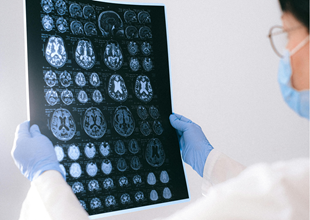A mathematical understanding of mental health: What data tells us about complex mental health conditions

Health professionals today remain challenged in both understanding the causes of and treating neuropsychiatric disorders including depression, Alzheimer’s disease, attention-deficit/hyperactivity disorder (ADHD) and more. Despite global efforts to study mental health, clinicians still face barriers to making accurate mental health diagnoses, identifying the origins of psychiatric problems and finding cures.
Computational modelling, a vital tool for identifying patterns that underlie complex processes, provides a new pathway for solving the mental health enigma mathematically. If mental health can be reduced to a math equation, it becomes possible to forecast disease risks and treatment outcomes, thereby preventing and mitigating mental health crises.
At PolyU, Prof. QIU Anqi, Professor in the Department of Health Technology and Informatics, seeks answers about the origin of individual differences in mental health from gigantic collections of data—brain images, genome sequences, caregiver reports, patient symptoms and many more. “Mental health problems can develop across a person’s lifespan, but each life stage comes with unique challenges,” Prof. Qiu explained. In her new capacity as the Director of the Mental Health Research Centre (MHRC), Prof. Qiu is poised to employ mathematical methods and an engineering approach in understanding human brain processes and their links with mental health disorders.
The diagnosis jigsaw puzzle
The routine diagnostic process in mental health includes a clinical interview in which physicians gather information about the patient’s symptoms, medical history, and current life circumstances through communication, observation and assessment. The subjectivity of patient self-reporting and comorbidity (the presence of multiple medical conditions simultaneously in a patient) are known factors that make clinical diagnosis of mental health a difficult art to master. In young children, such diagnosis is even harder.
“It is hard to determine whether a particular condition is normal for a child since children develop at different paces and in their own ways. The result is diagnostic uncertainty.”
“Children grow very fast, and they exhibit more dynamic presentations of clinical features,” Prof. Qiu explained. “Currently, the clinical diagnosis for mental problems among young children after the age of 6 is a knotty problem for medical doctors, psychiatrists and pediatricians. They are the professionals who follow the children as they grow. Childhood is a period of rapid development where variations across children also emerge. It is hard to determine whether a condition is normal for a child since children develop at different paces and in their own ways. The result is diagnostic uncertainty.”
“This uncertainty is particularly dangerous in making a diagnosis of attention-deficit/hyperactivity disorder (ADHD) or autism spectrum disorder (ASD) among children. During clinical examinations, kids with ADHD may interrupt and say some other things which they want to share. Meanwhile, children with ASD tend to be quiet; some may go completely silent. Not all children are good at expressing themselves, and this may result in misdiagnosis. Furthermore, doctors are uncertain about making a definite diagnosis as they worry about the fear that the diagnosis brings to parents, although the conditions can be changed and treated.”


Improving the art of diagnosis with science and technology
To disentangle the confusing issues in diagnosis, Prof. Qiu’s team developed an innovative approach to mental health diagnosis in children: multidimensional brain imaging analysis that integrates deep-learning artificial intelligence (AI) technology and multimodal magnetic resonance imaging (MRI) data. The new method uses diverse types of information, including brain images, genetic information, and caregiver reports, to identify groups that are at high risk for ADHD, depression and anxiety from the fetal stage through adolescence, enhancing predictive accuracy by up to 25%. “What the model does is to combine all factors and calculate a risk score. This is like making an objective diagnosis at the press of a single button,” Prof. Qiu said.

The start of an AI take-over?
When asked about the application of the AI-enabled system she developed in primary healthcare and the impact of AI on her research, Prof. Qiu emphasised the important role of physicians and clarified that her innovation is not trying to replace doctors.
“The AI system we developed would gain wide recognition from doctors, making diagnosis more convenient, objective and efficient by reducing the need for patients to undergo multiple diagnostic tests.”
“Humans are still smarter than AI in some ways,” she said. “In clinical setting, I see that AI can serve as an aid to doctors, helping them to make good clinical decisions based on their experiences and the objective information provided by the system. Ultimately, I hope that the AI system we developed and AI technologies at large can be used as a vital tool for mental health diagnosis. This is like medical tubes used in implants, surgical and dental instruments. The tubes are one of the oldest medical devices now widely used in various healthcare settings. I think the role of AI in healthcare is moving in this direction. I envision that as time goes by, the AI system we developed would gain wide recognition from doctors, making diagnosis more convenient, objective and efficient by reducing the need for patients to undergo multiple diagnostic tests.”


Happy mum, happy baby
Using a deep learning AI approach, Prof. Qiu’s team also validated a truth about maternal mental health: mothers’ emotions during pregnancy have a direct impact on fetal brain development. By integrating fetal MRI, genome sequencing, child behaviour assessments and maternal health records, the research has revealed that girls born to mothers who reported greater positive mental health during pregnancy exhibited changes in several neural networks, including those linked to memory performance, as well as emotion perception and regulation.
This significant finding reminds us of a popular quote, “happy mum, happy children”. The best gift a mother can give to her children is to take care of her own happiness. While the idea of “keeping mum happy” is not new, an important take-away from Prof. Qiu’s study is that the impact of maternal mental health on children starts before childbirth.
“Our investigation focuses on the pregnancy stage because it is the very beginning of human lives.”
“Our investigation focuses on the pregnancy stage because it is the very beginning of human lives. I personally see the fetal stage as more critical than the postnatal stages because processes within the mother’s body, such as emotion, can directly influence children’s development,” Prof. Qiu said. “Depression and stress during pregnancy can bring about biochemical responses such as hormonal changes and other signals which can be transferred directly to the fetus through the placenta.”
Past studies on the link between maternal and children’s mental health have been focused on genetic inheritance and parenting behaviour. Prof. Qiu’s research provides a new perspective. “Epidemiological studies have shown clearly that children born to mothers affected by depression during pregnancy are at high risk for mental problems. Our research has unveiled the mechanism behind this phenomenon,” she explained. This fundamental finding holds profound implications for mental health interventions. To Prof. Qiu, a more direct, fundamental route to addressing mental health problems should focus on “treating the entire family” in addition to “treating the child”—providing family support, fostering a mother-friendly workplace environment and improving social welfare at large.


Keeping your brain young is your responsibility
On the other end of the age spectrum, modern medicine is still nowhere near a cure for Alzheimer’s disease, although there are treatments for slowing down its progression and reducing symptoms. Still, research has shown that preventing and delaying the onset of dementia is possible.
In another study by Prof. Qiu, sustained obesity was found to be linked to accelerated brain ageing in middle-aged and older adults. The research suggested that persistent obesity could be used as a potential biomarker for assessing brain ageing. Crucially, the study pointed to the importance of weight management for preserving brain health. We have no excuse for not exercising and staying healthy, to a certain extent.
“Healthy habits can be maintained through exercise, diet and other factors that we manipulate and control by ourselves.”
“In my view, mental health intervention approach should focus on ‘treatment for children’ and ‘prevention for elderly adults,” Prof. Qiu said. “From the big data we studied, it is clear that lifestyle is more important in determining the brain health of old adults. Healthy habits can be maintained through exercise, diet and other factors that we manipulate and control by ourselves.”
When asked for her conclusions regarding lifestyle tips for better health after decades of research, Prof. Qiu pointed to good sleep, nutrition and stress management. “The food we eat affects our blood pressure and sugar levels, and research has already indicated their associations with symptoms of mental health disorders. Chronic stress can cause the hypothalamic–pituitary–adrenal (HPA) axis, a complex hormone network in our body, to become dysregulated, and HPA axis malfunction is widely observed in patients with mental illnesses.”


Finding the competitive edge for PolyU’s mental health research
In August 2023, Prof. Qiu joined PolyU under the Global STEM Professorship Scheme of the HKSAR Government. Previously, she served as a departmental deputy head, innovation centre director, and college master at National University of Singapore (NUS). After spending over 20 years abroad, she and her family decided it was time to return home to China. Hong Kong and PolyU provide attractive conditions for scaling up her research and driving it forward.
“The unique location of Hong Kong enables researchers to collaborate at international and national levels,” Prof. Qiu observed. “I also feel that PolyU offers very strong internal support to researchers, not only in terms of funding, but also guidance on formulating research ideas from senior faculty, as well as external networks and administrative support. The whole university ecosystem is very helpful for pushing researchers forward.” In her new role as the Director of the Mental Health Research Centre, Prof. Qiu aspires to inject the engineering approach into the centre’s research by leveraging PolyU’s engineering strength and world-class research facilities.
“PolyU has numerous devices that support the use of the engineering approach to study mental health, including AI tools for speeding up data monitoring and collection processes, and transcranial magnetic stimulation (TMS) devices for treating mental health symptoms. These will enable me to steer the centre in the engineering direction and towards larger-scale research,” she said.
This year, Prof. Qiu has been elected as the Council Chair of the Organization for Human Brain Mapping, an international society dedicated to advancing the understanding of the anatomical and functional organisation of the human brain using neuroimaging. Stepping into a higher leadership role at the organisation which she has served for many years, Prof. Qiu has high ambitions for her new career journey in Hong Kong—to build up Hong Kong’s presence and visibility in the field of brain mapping in collaboration with other reputable universities in the discipline.



Please put at least one valid content allocate to this component.
Please put at least one valid content allocate to this component.
Please put at least one valid content allocate to this component.
Please put at least one valid content allocate to this component.
Please put at least one valid content allocate to this component.
Please put at least one valid content allocate to this component.


